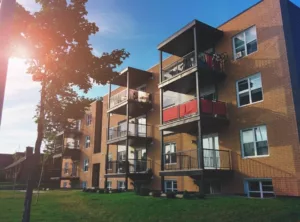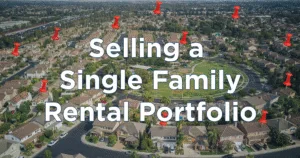Is investing in overseas real estate risky? Or is it riskier to have all your eggs in one basket known as the US real estate market?
Initially, when I was asked this question – and I will be honest here – I thought it was too risky to consider going overseas. But the more I learn of the Federal Reserve’s power over the US economy, the more I consider offshore investing an essential diversification.
If you’re new to investing overseas, where do you start? With language, legal, title, financial, government, and numerous other difference – the best place to start is where you have a connection. Here are 3 things to consider.
1. Have a Connection to the Market
As a real estate investor, we can go back to our basic knowledge: all real estate is local. Buying in a market without having a trusted connection to the truth and customs is risky.
I have a brother-in-law who was born and raised in Bolivia. So, for me, having a local know/like/trust connection there is a good place to start.
Have you gone on mission trips? Did you study abroad in college? How about a tour in the Armed Forces? Looking for any personal connection you have to another country is a good place to start.
Many countries may limit the ability of non-residents to purchase their real estate, though, so after identifying a country you’ll need to learn in-depth about what rules and restrictions may exist.
What countries allow foreign ownership of real property?
1. United States
2. Canada
3. Australia
4. New Zealand
5. United Kingdom
6. Germany
7. France
8. Italy
9. Spain
10. Portugal
11. Brazil
12. Mexico
13. Argentina
14. Chile
15. Colombia
16. Costa Rica
There are others as well, but these countries have the most open rules on purchasing in country, with certain limitations:
- Some European countries have “Golden Visa” programs, where foreigners are granted residency in exchange for investing a certain amount into the country. Often, this can take the shape of investments into real estate, so beware of buying into a market where prices are driven up by these types of incentives.
- Puerto Rico has a substantial tax credit for people who move from the US to Puerto Rice and make it their home for at least 51% of the time. If this is your motivation – then great. But if you are just looking to purchase real estate in areas affected by these programs rather than moving there, beware! You may be paying for overvalued real estate if the laws change.
Those beautiful new builds that you see in the glossy in-flight magazines look amazing, don’t they? If you follow that ad, you’ll certainly be taken to an area in Istanbul that indeed has that building. What they won’t tell you is that the area it’s in is incredibly dangerous, and the nation is still having to deal with illegal settlements from Syrian refugees.
Years (or more likely, weeks) later, when you realize your mistake, you’ll want to sell. But as luck would have it, most other property buyers aren’t ignorant foreigners who are easily fooled by pretty pictures.
The shinier it looks, or the more it seems to be geared towards foreigners, the faster you should run. This is why you need to be careful about investing in any country where there’s investor Golden Visa programs – wealthy foreigners stampede into the region and bid up the value of subpar sites because they don’t actually care for the real estate itself.
2. Go for the Gold
Think about the cities around the world that host the Olympic Games. These are never small, no-name cities. They are places that people want to be, with infrastructure that can support a tremendous influx of the world’s finest athletes and high net worth visitors.
Cities that have enough political clout and investment dollars are ones that get picked as hosts of the games. Capital cities are almost always a safe bet, as they are better insulated and typically are places where people want to be.
Now, consider this in your decision to invest there. Will London go down in value? Probably not. But if you buy far off in the countryside, it is possible that the area will lose value over time. Be careful of your other overall factors.
Prime locations will always continue to be in demand, pricey locations. Buying on the fringes just because it’s cheaper may come back to haunt you, so always buy based on location first! The old adage is true here – buy the ugliest house in the best neighborhood you can.
But what about resorts?
Flashy brochures, gleaming sunlight, and sand beaches… Sure, we all want to own something beautiful that we can enjoy while we make money on it. But when you start investing in another country for the resort or vacation lifestyle, think about some outside factors first.
In recent years, my family took a vacation to Costa Rica. I had heard multiple people say they own real estate in CR and greatly enjoy it. During the stay, the Airbnb house we had rented had a “security guard station” (aka a shack in the back) where an older gentleman who only spoke Spanish sat, all day, to provide us security. While that was somewhat comforting, it also made us question what we needed guarding from?
Then, there was a DOWNPOUR of rain for 28 hours (yes, we did go during the rainy season) in which the dirt road that we were staying on flooded over. The entire area around the house was covered with water. Our security guard warned us to evacuate once the water reached the threshold of the house, since it was a one-story home. We ended up holding our belongings over our heads and wading through water to reach higher ground.
Needless to say, the stormwater runoff facilities, police stations, and other infrastructure items within the country are lacking. This leaves property owners with more financial weight to compensate.
So, where do you find properties with built-in asset protection overseas?
Look for tier A locations. It’s a bit of a cliche to say, but it’s commonplace for a reason: land accumulates in value because they aren’t making more of it. Land is subject to the laws of supply and demand.
The more developed the area and the more densely populated, the more you can expect the location to hold value over the long term. It’s still location, location, location.
The challenge of a resort environment is that any coastal country can create one. Costa Rica is great, until the flooding becomes such a challenge that it hurst the tourism industry. Once tourists have migrated to other countries for their vacations, it’s much harder to bring them back.
3. Know the Local Customs
Finders: Be very careful not to get taken advantage of by organizations that exist just to help a foreign investor. Some agents/finders may be paid exorbitant commission fees for recommending certain locations and properties.
Fees: Some countries charge out-of-country investors substantial transfer fees.
Maintenance Costs: Again, beware of countries that want to charge more than a fair rate, just because the investor is foreign.
Go Direct: As much as possible, be directly involved. This will help to remove those who don’t have your best interest in mind from the equation, keeping more dollars in your pocket.
Think About Financing: In many countries, foreigners cannot get loans. If they do, it’s often very low LTV.
Favorable Exchange Rates: Look for countries with an exchange rate that is very favorable with US currency to make your dollar stretch further.
Conclusion:
We just barely scratched the surface here with things you should consider in offshore real estate investing. That’s part of what’s so exciting about it – the world is our oyster, and there is no end to the learning and growing we can do as investors.
Drop us a line and let us know if you’ve invested out of country – we’d love to hear about your experience and what you learned!
Sources
https://nomadcapitalist.com/finance/investing/how-to-invest-in-real-estate-overseas/





